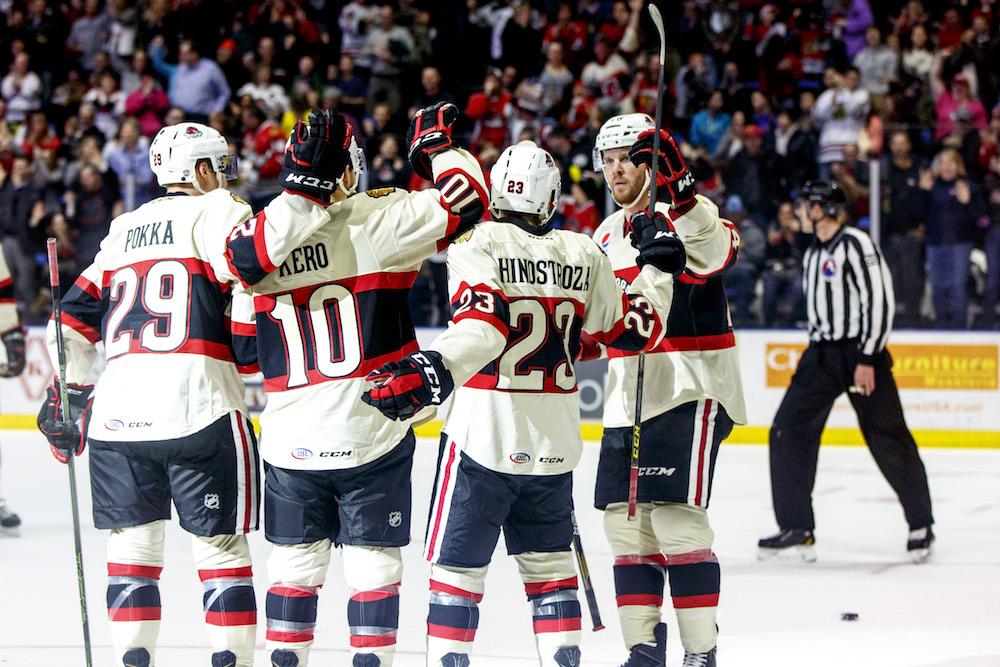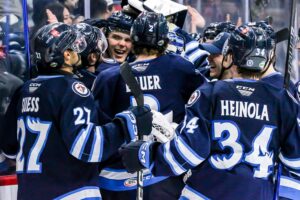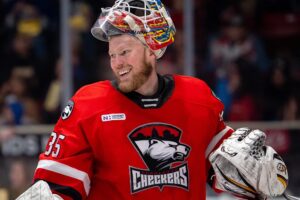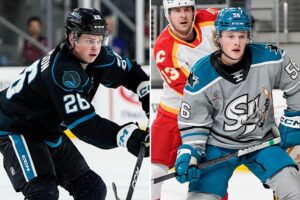By Alec Lessner | AHL On The Beat Archive
In professional hockey, the conventionally accepted team-building method is to find talent in the draft, develop players in the American Hockey League, and pick up missing pieces through trades. It’s much easier said than done, though; ego, impatience, and inconsistency can all derail an organization’s path to a championship.
The relationship between the Chicago Blackhawks and the Rockford IceHogs is one of the best examples of what NHL teams strive to achieve with their AHL affiliates. Rockford consistently produces players ready for recall and to produce at the NHL level while still putting a winning product on the ice. Despite seeing an average of more than 10 players recalled to play in Chicago every year, the IceHogs have posted a winning record in each of their eight affiliated seasons and are well on their way to their ninth winning campaign.
22 IceHogs alumni have won at least one Stanley Cup with the Blackhawks, while seven of those did so twice. Niklas Hjlamarsson played in Rockford before having his name etched on the sport’s greatest trophy three times.
There is no great mystery as to how the Blackhawks and IceHogs have achieved their mutually beneficial relationship. The culture in Rockford reflects that of the big club; the players and coaching staff are humble, patient, and committed to both self-improvement and team success.
Mark Bernard, Blackhawks General Manager of Minor League Affiliates, believes the commitment of resources to developing talent is one of the most significant factors on both teams’ success.
“We really started focusing heavily on our development department over the last seven years where we really made it our mandate to develop players,” said Bernard. “We’re very lucky that we’ve been given the resources through Chicago to have a great development team as well as a great coaching staff here in Rockford.
“It’s led by Barry Smith (Director of Player Development), and we have Yanic Perreault, Anders Sorensen, Mark Eaton, Kevin Delaney, Derek Plante (Development Coaches), and Peter Aubry (Developmental Goaltending Coach). They’re constantly working with our players both at the professional level, in juniors or college, and in Europe.”
Bernard believes that the Blackhawks sustained success lends a sense of patience to prospects, saying, “The players always want to be in the National Hockey League right now. They’re young, and have to learn it’s a process.
“I think with our organization, they see that our young players are developed properly and given a chance to play in Chicago. If they take advantage of that opportunity, they’ll remain there. I think our young players are a little more open to the process and understand how it works.”
Ted Dent has been at the helm of the IceHogs for the last five seasons after serving as an assistant coach from 2006-2011. He understands his end of the bargain as the head coach of a team that is expected to feed NHL-ready players to Stanley Cup championship teams.
“Getting guys called up to play in the NHL is what it’s all about,” said Dent. “We’re here to provide that platform and get players better so they can make that jump.”
Dent said he and his staff coordinate closely with that of the Blackhawks to ensure player preparedness. “We talk to Joel (Quenneville) at the beginning of the year and identify what he wants us to play in a similar fashion to his team. We follow through on that so guys have a seamless transition,” he said.
The most pressing task for the IceHogs coaching staff is to fill the holes left by recalls and produce the next gem, which Dent and his counterparts take in stride.
“Whoever shows up in the morning and whoever’s on the roster is who you work with every day and try to make better,” said Dent.
This head-down, results-oriented attitude trickles down to the way the players approach their success, and 12 IceHogs have broken through to play at least one game with the Blackhawks this season. Bryan Bickell, Phillip Danault, Marko Dano, Erik Gustafsson, Ryan Hartman, Vince Hinostroza, Tanner Kero, Michael Leighton, Brandon Mashinter, Mark McNeill, Dennis Rasmussen, and Viktor Svedberg have each earned recalls to Chicago during the 2015-16 season. Six made their NHL debuts. Overall, 16 players have played for Rockford and in the NHL this season.
Recalls are crucial to player development in the model the Blackhawks follow. Some players stick in the NHL while others gain valuable insight into what they can work on when they return to the AHL.
After returning to Rockford following a recent recall to Chicago, Svedberg returned to the IceHogs with a plan on how to return to the NHL.
“(The coaching staff in Chicago) told me what they want me to get better at and that’s what I’m trying to work on every day,” said Svedberg.
Hartman, a West Dundee, Illinois-native with eight games of NHL experience under his belt in two professional seasons, expresses similar sentiments.
“You can look at being sent down as being a negative or a positive,” said Hartman. “I see it as a positive. Even though you are being sent down, you were up at some point and they obviously like your game if they were bringing you up in the first place.
“You have to bring that positivity here and do what they want you to do and be the player they want you to be. If you do that, you’ll be back up there in no time.”
Hartman’s attitude about recalls hints at the benefits of easing players into the big leagues; stints in the NHL not only affirm what prospects need to work on, but they also generate self-confidence.
Kero, who scored his first NHL goal with the Blackhawks on Nov. 6, speaks to the importance of NHL experience in building his belief in his own abilities.
“You get that confidence going up there and you see what it takes to play at that level,” said Kero. “You try to emulate that as much as you can when you’re down here and work as hard as you can to get back.”
He and other prospects credit organizational consistency for making their transitions as easy as possible, especially when it comes to playing similar systems on the ice.
“We try to do as much as we can here to simulate what they’re doing up top. I think they do a great job of that here in Rockford,” said Kero.
Svedberg, Hartman, and Kero also appreciated seeing familiar faces when they entered Chicago’s locker room. Hartman describes his first recall as nerve-wracking, and says he didn’t know what to expect. When he encountered former teammates, the pressure wore off quickly.
“As you get your first practice, first shift, and first game in, everything gets easier,” said Hartman. “I was playing with Dano and Kero down here and we were on the same line up there. That definitely makes the transition a lot easier because you’re playing with the same guys and you know where the others are going to be.”
The key, it seems, is to use recalls to give prospects success in small doses and elevate their abilities through progressive steps instead of rushing them through the system.
The taste of success lingers for those who have seen NHL action this season, especially those who have scored their first goals. Svedberg and Kero can’t help but to crack smiles when they reflect.
“It was pretty surreal. I wasn’t expecting to score as early as I did, so it was really nice,” said Svedberg.
“It was pretty special,” said Kero. “I wish mine would have happened at a better time in the game, but it was a dream come true.”
When Dent discusses the impact the success of Rockford’s graduates has on him, it’s his selflessness that reminds why the IceHogs have been such significant contributors to the Blackhawks championship runs.
“There’s a sense of pride in not only myself but in the whole coaching and training staff,” said Dent. “When you see the guys you’ve worked with down here for a number of years go up and make an impact in the NHL, it’s a good feeling for sure.”






































